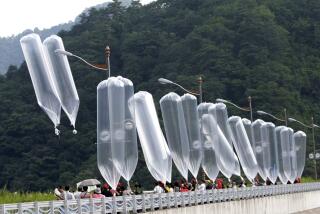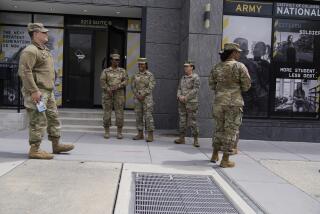U.S. Plan to Cut Troops Worries Allies in Asia : Defense: Bushâs intention to shut three air bases in South Korea also causes concern among the Japanese.
TOKYO â President Bushâs announced intention to reduce the level of U.S. troops in South Korea sent a chill Tuesday through official quarters in Japan and South Korea.
In the 1991 national budget proposed Monday by Bush, the Pentagon calls for shutting down U.S. Air Force operations at three air bases in South Korea as part of a move to restrain defense spending and restructure the military. It would result in a personnel reduction of only 2,000--but Japanese and South Korean officials interpreted the move as more far-reaching than the numbers would seem to indicate.
Despite Defense Secretary Dick Cheneyâs assurances of a continuing military commitment to Japan and South Korea, officials here are wondering: If the United States cannot afford to sustain a peacetime deterrent, what would it be able to do in the event of war?
In 1972 and again in 1978, the United States carried out major reductions of its forces in South Korea, but on neither occasion did it describe the reduction as the result of economic difficulties at home.
Unlike the situation in Eastern Europe, where the collapse of Communist governments has lessened the potential threat to Western Europe, military tension on the Korean peninsula has, if anything, become worse.
Diplomatic recognition of the South Korean government by three Eastern European nations, together with the establishment of consular relations between Seoul and Moscow, has weakened the Soviet Unionâs political support for North Korea. So too have the growing, if unofficial, ties between South Korea and China.
But the Communist government of President Kim Il Sung not only has refused to open up North Korea politically and economically or to cut back on military spending, but also it has begun construction of a nuclear fuel-enrichment plant that could be used to produce nuclear weapons, as the United States disclosed last summer with a declaration of alarm.
Twice last year, during a visit to Seoul in February and again when South Korean President Roh Tae Woo visited Washington in October, Bush assured South Koreans that the United States would keep its troops in South Korea as long as the threat from the North continued. He hinted in October that the 43,000 U.S. troops based in South Korea might be reduced, but this was soft-pedaled.
Officials in Seoul, who have been struggling to dissuade Washington from reducing its troop strength in South Korea, and officials in Tokyo, where the U.S. military presence in Asia is still valued, tried Tuesday to put the best possible face on the news from Washington. But in both capitals, beneath public expressions of confidence that the U.S. military deterrent will continue strong, there was clearly uneasiness mixed with shock.
South Korean Defense Minister Lee Sang Hoon emphasized that the withdrawals, which are to begin in October and be completed in July of 1992, will involve mainly noncombatants. He said the South Korean Air Force will acquire reconnaissance aircraft to take over the intelligence mission now performed by the 18 RF-4Cs the United States plans to withdraw.
Lee said Seoul will increase its âshare of the defense burden so that the United States can commit itself not to withdraw ground forces unilaterally.â
The South Korean defense chief also said the United States will send a squadron of 24 F-16 jet fighters to South Korea between July and September--thus actually strengthening its firepower on the peninsula. Cheney made no mention of such a move.
Defense Ministry officials in Seoul were quoted as describing the proposed troop cuts as âan important change in American strategy toward the Far East,â one they fear could lead to a reduction of the 43,000 troops--ground forces--that serve as a guarantee of U.S. help in the event of attack.
Only last December, U.S. Ambassador Donald Gregg assured South Koreans that âthe threat from the North had not been reduced to the level that we might be considering a withdrawal.â
In November, a highly placed diplomat in Seoul, speaking on the condition of anonymity, told The Times that the United States believed that any changes in Communist North Korea that would result in an easing of tension on the Korean peninsula would be âdifficultâ until the death of President Kim.
This diplomat acknowledged, however, that the U.S. âbudget deficit and pressures on defense spendingâ had made troop reduction an unavoidable topic.
Asked about the effect of a reduction for budget reasons on the credibility of the U.S. security pledge to South Korea, the diplomat said South Koreans were preparing to assume a greater role in their defense. But he said maintaining a strong U.S. presence in South Korea well into the 1990s was essential âto avoid sending the wrong signalâ to North Korea.
Although no cutbacks were announced Monday in U.S. forces based in Japan, Cheney said he will discuss a possible reduction of forces on the southern island of Okinawa and in the rest of Japan when he visits Tokyo in late February.
Chief Cabinet Secretary Mayumi Moriyama, emphasizing the need for âappropriate maintenance of the American presenceâ in the Asia-Pacific region, said there had been no specific talks about reducing the 63,000 U.S. troops stationed in Japan.
âDiscussing this or that (cutback) in the near future is unthinkable,â she said.
Earlier, Defense Agency officials had reacted to a leak of Cheneyâs announcement with overt shock. Despite the aura of detente in Europe, defense experts here say they see little evidence of a downturn in Soviet military power in Asia.
Juro Matsumoto, director general of the Defense Agency, predicted that the Japanese public would interpret the U.S. announcement as a signal for Japan to follow suit and cut its defense budget.
More to Read
Sign up for Essential California
The most important California stories and recommendations in your inbox every morning.
You may occasionally receive promotional content from the Los Angeles Times.










